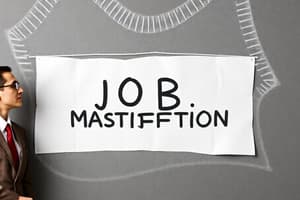Podcast
Questions and Answers
What is the primary focus of knowledge management in an organization?
What is the primary focus of knowledge management in an organization?
- Economic growth and profit maximization
- Strict adherence to regulations and compliance
- Customer satisfaction and feedback management
- Creating, sharing, and managing knowledge (correct)
Which concept emphasizes the importance of continuous learning and improvement among organizational members?
Which concept emphasizes the importance of continuous learning and improvement among organizational members?
- Continuous improvement
- Evidence-based management
- Knowledge management
- Learning organization (correct)
What is the essence of Evidence-Based Management (EBM)?
What is the essence of Evidence-Based Management (EBM)?
- Decision making based on intuition and past experience
- Making decisions based on hard facts and meaningful research (correct)
- Focus on employee satisfaction and workplace culture
- Reliance on traditional management theories
According to Michael Porter, what does competitive strategy primarily involve?
According to Michael Porter, what does competitive strategy primarily involve?
Which of the following best describes Joseph Juran's view on quality management?
Which of the following best describes Joseph Juran's view on quality management?
What does Theory X assume about workers?
What does Theory X assume about workers?
Which management style is embraced by Theory Y?
Which management style is embraced by Theory Y?
What is the first level in Maslow's Hierarchy of Needs?
What is the first level in Maslow's Hierarchy of Needs?
According to Maslow's theory, which needs must be satisfied first to achieve self-actualization?
According to Maslow's theory, which needs must be satisfied first to achieve self-actualization?
What does the Modern Management Approach emphasize?
What does the Modern Management Approach emphasize?
Which of the following is NOT a focus of the Quality Movement led by W. Edwards Deming?
Which of the following is NOT a focus of the Quality Movement led by W. Edwards Deming?
Which aspect does the Adult Personality Theory emphasize?
Which aspect does the Adult Personality Theory emphasize?
What is a key component of operational research tools in management?
What is a key component of operational research tools in management?
Flashcards are hidden until you start studying
Study Notes
Motivational Strategies
- Methods to alter motivation include threats, mandatory service for a product, or educating members on specific values like professional or religious ethics.
Theory X and Theory Y - Douglas McGregor
- Theory X posits that workers dislike work and are inherently lazy, prompting autocratic management that involves close supervision and punitive measures.
- Theory Y suggests that workers are self-motivated and thrive under participative management, focusing on empowering employees to perform well.
Hierarchy of Needs - Abraham Maslow
- Five levels of human needs: physiological, safety, love and belonging, esteem, and self-actualization.
- Lower-level needs must be addressed before individuals can focus on higher-level aspirations.
- Understanding employee needs is essential for motivating productivity and fulfillment.
Adult Personality Theory - Chris Argyris
- Focuses on the needs and capabilities of mature adults in the workplace.
- Encourages job variety, expanded responsibilities, and supervisory styles that allow for increased participation.
Modern Management Approach (1950-1960)
- Involves quantitative analysis and tailored management responses to unique business situations, rejecting a "one size fits all" philosophy.
Management Science and Operational Research
- Employs quantitative methods for production and operations, valuable for both manufacturing and service delivery.
- Emphasizes tools such as value chain analysis, inventory management, and quality control.
Quality Movement - W. Edwards Deming & Joseph Juran
- Total Quality Movement led by Deming promotes quality as a critical organizational strategy stressing continuous improvement.
- Juran's Plan-Do-Check-Act Cycle focuses on a commitment to quality and systematic improvement of processes and responsibilities.
Knowledge Management - Peter Drucker
- Knowledge management strategies enhance organizational effectiveness through systematic creation, sharing, and utilization of knowledge.
- Intellectual Capital is emphasized as vital for competitive advantage, with new information driving technological growth.
Learning Organization - Peter Senge
- Focuses on continuous learning and improvement, promoting information sharing, collaboration, and employee empowerment.
Evidence-Based Management (EBM) - Jeffrey Pfeffer
- Developed by Pfeffer, EBM prioritizes decision-making based on empirical evidence and research findings.
- Aims for actionable management insights and effective case study analysis.
Competitive Strategy - Michael Porter
- Porter develops analytical techniques for evaluating industry and competitive dynamics.
- Focuses on identifying internal and external competitive factors impacting organizational performance.
Studying That Suits You
Use AI to generate personalized quizzes and flashcards to suit your learning preferences.




